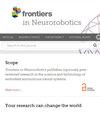Optimization method for human-robot command combinations of hexapod robot based on multi-objective constraints
IF 2.8
4区 计算机科学
Q3 COMPUTER SCIENCE, ARTIFICIAL INTELLIGENCE
引用次数: 0
Abstract
Due to the heavy burden on human drivers when remotely controlling hexapod robots in complex terrain environments, there is a critical need for robot intelligence to assist in generating control commands. Therefore, this study proposes a mapping process framework that generates a combination of human-robot commands based on decision target values, focusing on the task of robot intelligence assisting drivers in generating human-robot command combinations. Furthermore, human-robot state constraints are quantified as geometric constraints on robot motion and driver fatigue constraints. By optimizing and filtering the feasible set of human-robot commands based on human-robot state constraints, instruction combinations are formed and recommended to the driver in real-time, thereby enhancing the efficiency and safety of human-machine coordination. To validate the effectiveness of the proposed method, a remote human-robot collaborative driving control system based on wearable devices is designed and implemented. Experimental results demonstrate that drivers utilizing the human-robot command recommendation system exhibit significantly improved robot walking stability and reduced collision rates compared to individual driving.基于多目标约束的六足机器人人机指令组合优化方法
由于人类驾驶员在复杂地形环境中远程控制六足机器人时负担沉重,因此亟需机器人智能辅助生成控制指令。因此,本研究提出了一个基于决策目标值生成人机指令组合的映射过程框架,重点关注机器人智能协助驾驶员生成人机指令组合的任务。此外,人机状态约束被量化为机器人运动的几何约束和驾驶员疲劳约束。通过基于人机状态约束条件对可行的人机指令集进行优化和筛选,形成指令组合并实时推荐给驾驶员,从而提高人机协调的效率和安全性。为了验证所提方法的有效性,设计并实现了基于可穿戴设备的远程人机协同驾驶控制系统。实验结果表明,与单独驾驶相比,使用人机指令推荐系统的驾驶员明显提高了机器人行走的稳定性,降低了碰撞率。
本文章由计算机程序翻译,如有差异,请以英文原文为准。
求助全文
约1分钟内获得全文
求助全文
来源期刊

Frontiers in Neurorobotics
COMPUTER SCIENCE, ARTIFICIAL INTELLIGENCER-ROBOTICS
CiteScore
5.20
自引率
6.50%
发文量
250
审稿时长
14 weeks
期刊介绍:
Frontiers in Neurorobotics publishes rigorously peer-reviewed research in the science and technology of embodied autonomous neural systems. Specialty Chief Editors Alois C. Knoll and Florian Röhrbein at the Technische Universität München are supported by an outstanding Editorial Board of international experts. This multidisciplinary open-access journal is at the forefront of disseminating and communicating scientific knowledge and impactful discoveries to researchers, academics and the public worldwide.
Neural systems include brain-inspired algorithms (e.g. connectionist networks), computational models of biological neural networks (e.g. artificial spiking neural nets, large-scale simulations of neural microcircuits) and actual biological systems (e.g. in vivo and in vitro neural nets). The focus of the journal is the embodiment of such neural systems in artificial software and hardware devices, machines, robots or any other form of physical actuation. This also includes prosthetic devices, brain machine interfaces, wearable systems, micro-machines, furniture, home appliances, as well as systems for managing micro and macro infrastructures. Frontiers in Neurorobotics also aims to publish radically new tools and methods to study plasticity and development of autonomous self-learning systems that are capable of acquiring knowledge in an open-ended manner. Models complemented with experimental studies revealing self-organizing principles of embodied neural systems are welcome. Our journal also publishes on the micro and macro engineering and mechatronics of robotic devices driven by neural systems, as well as studies on the impact that such systems will have on our daily life.
 求助内容:
求助内容: 应助结果提醒方式:
应助结果提醒方式:


